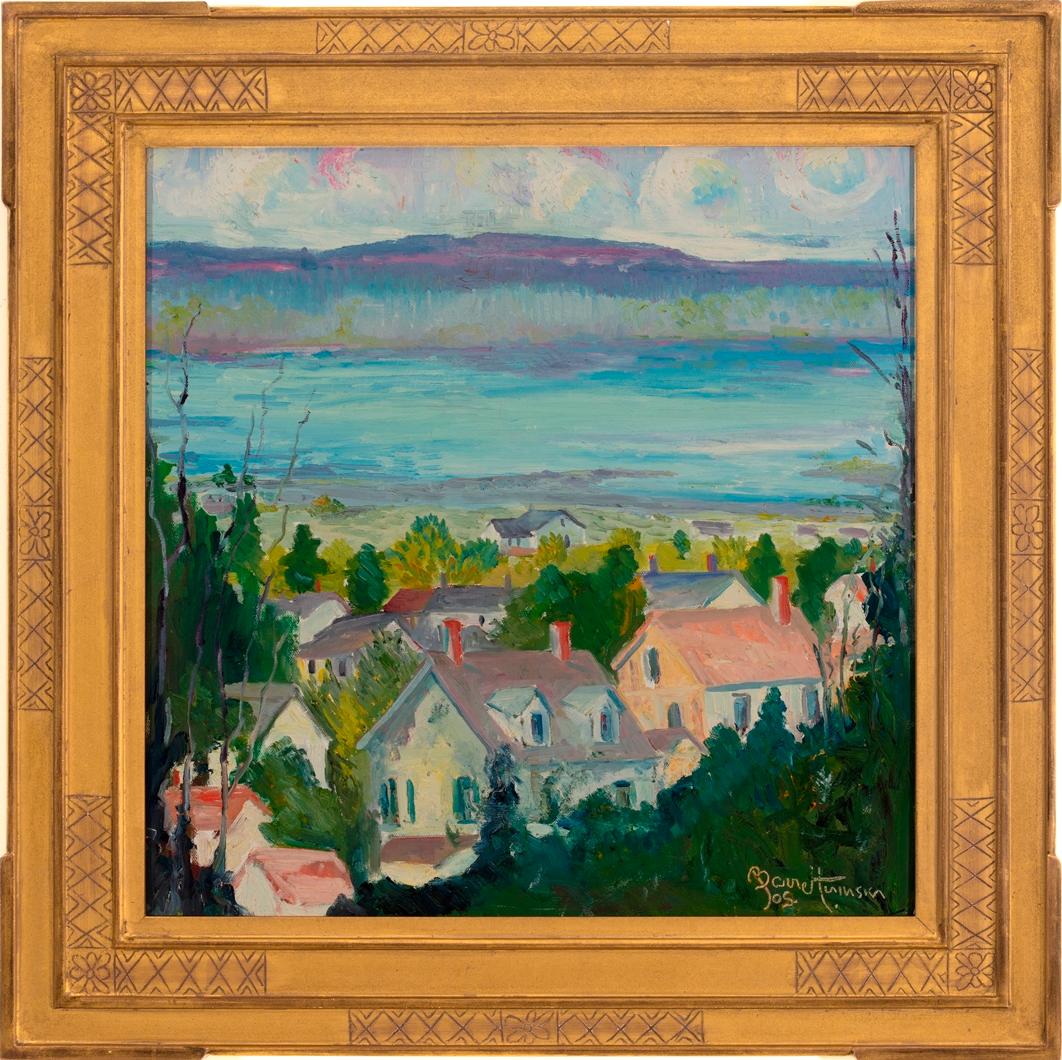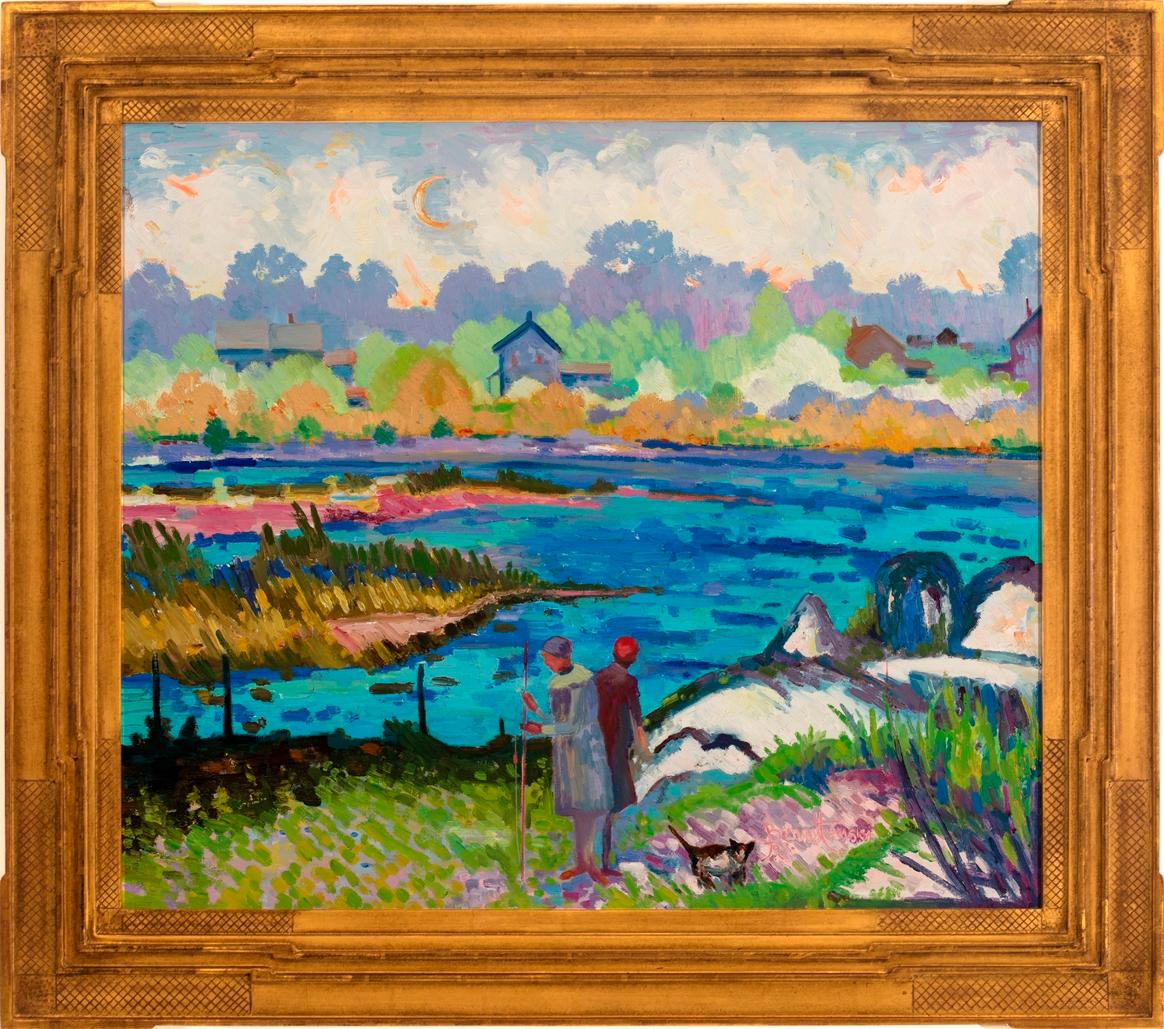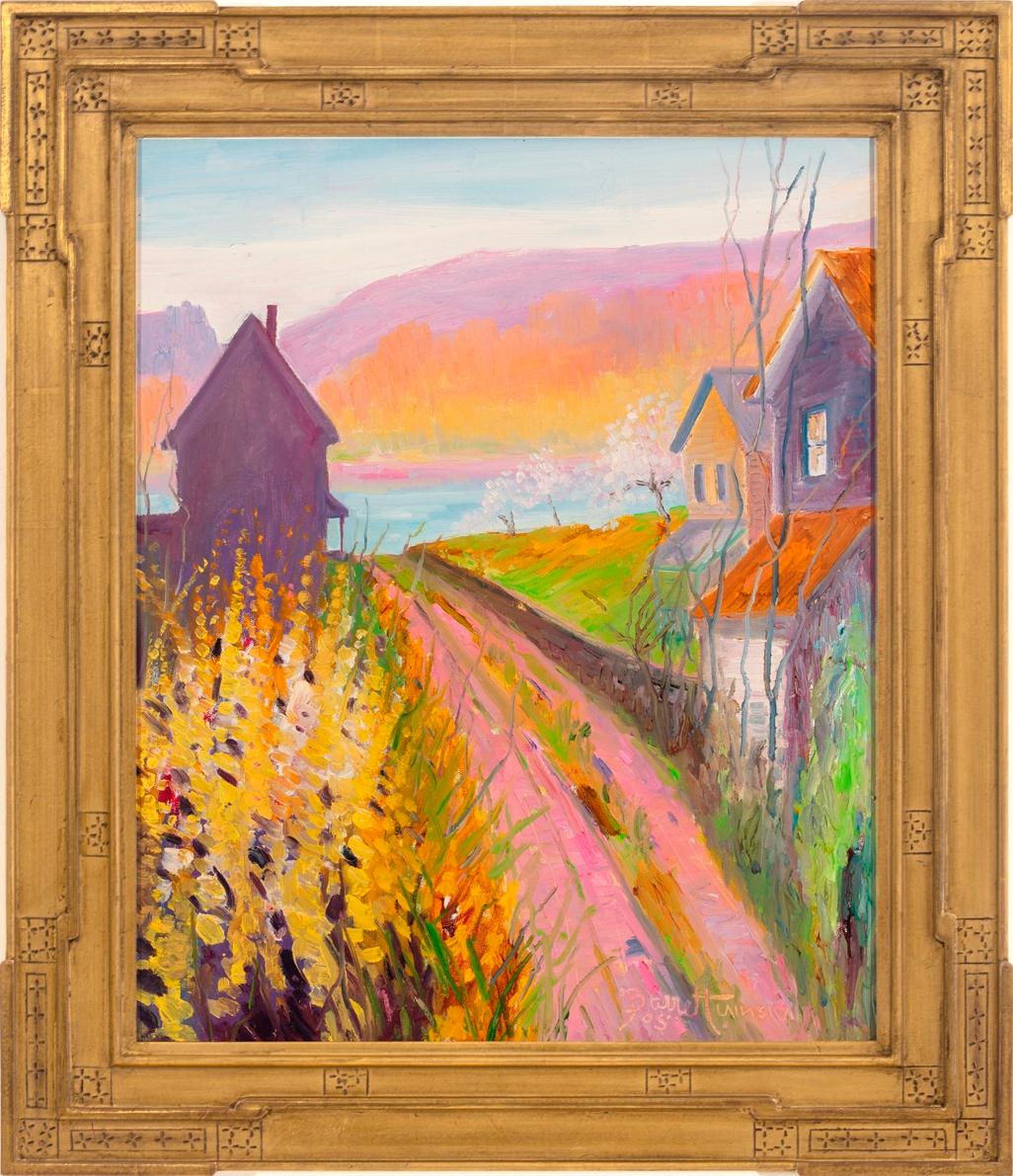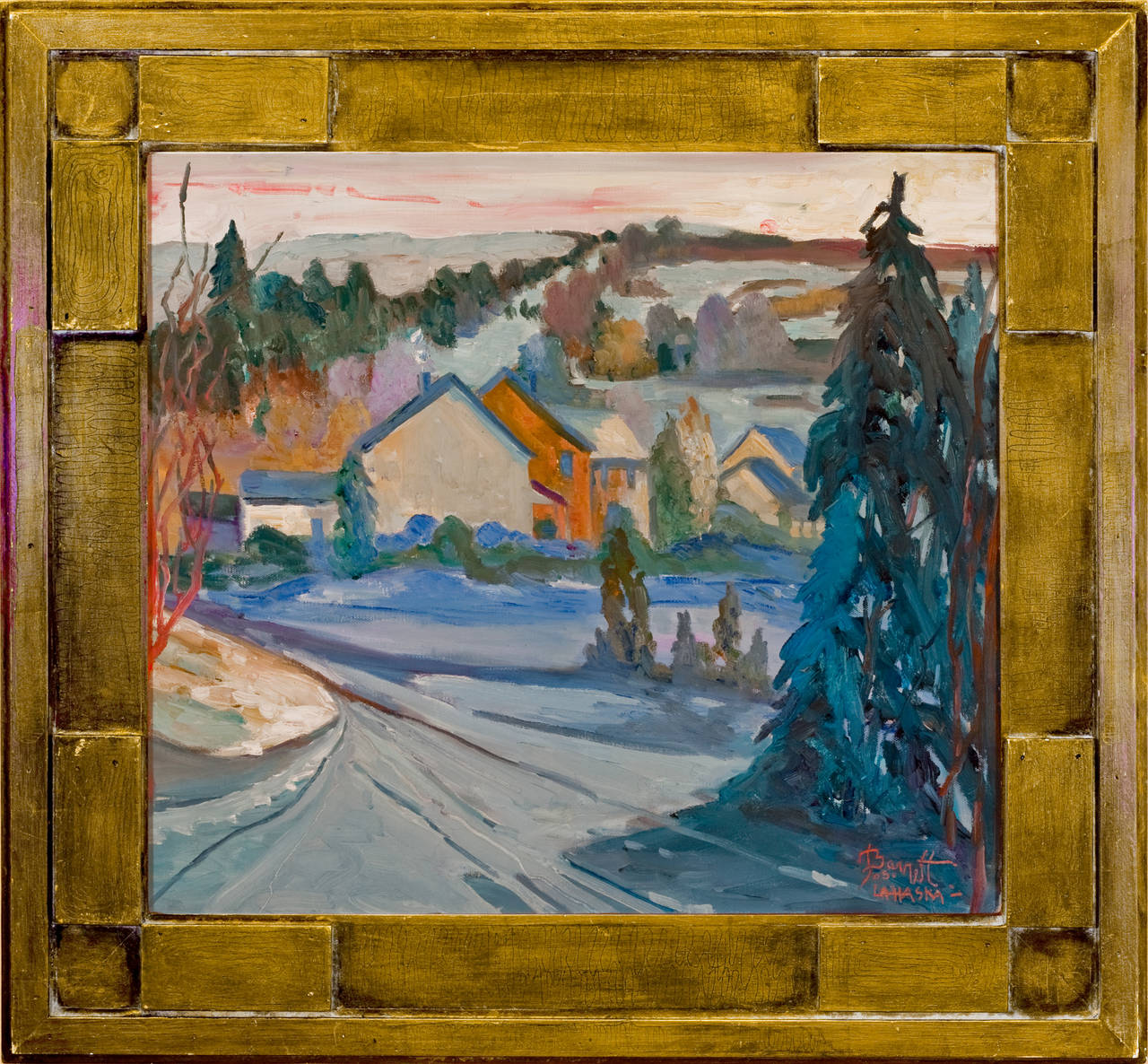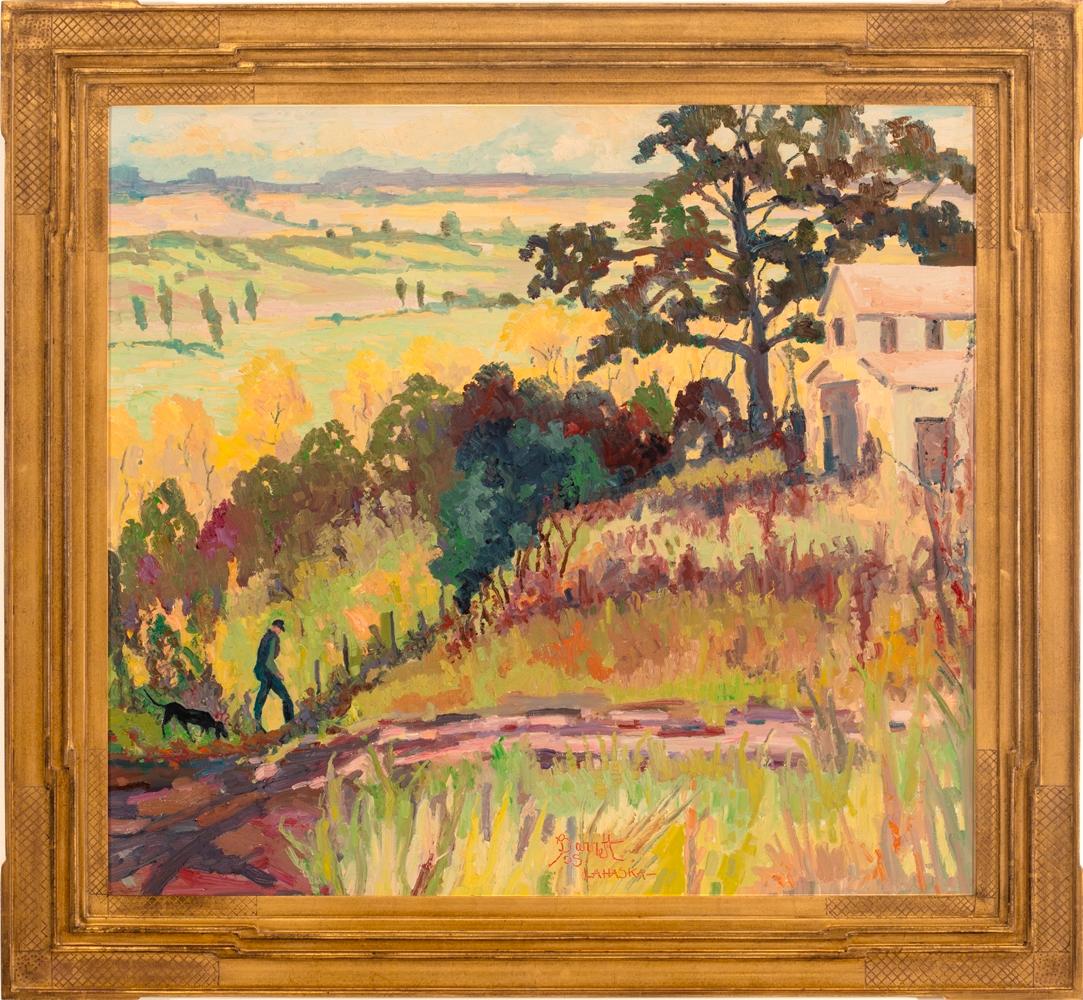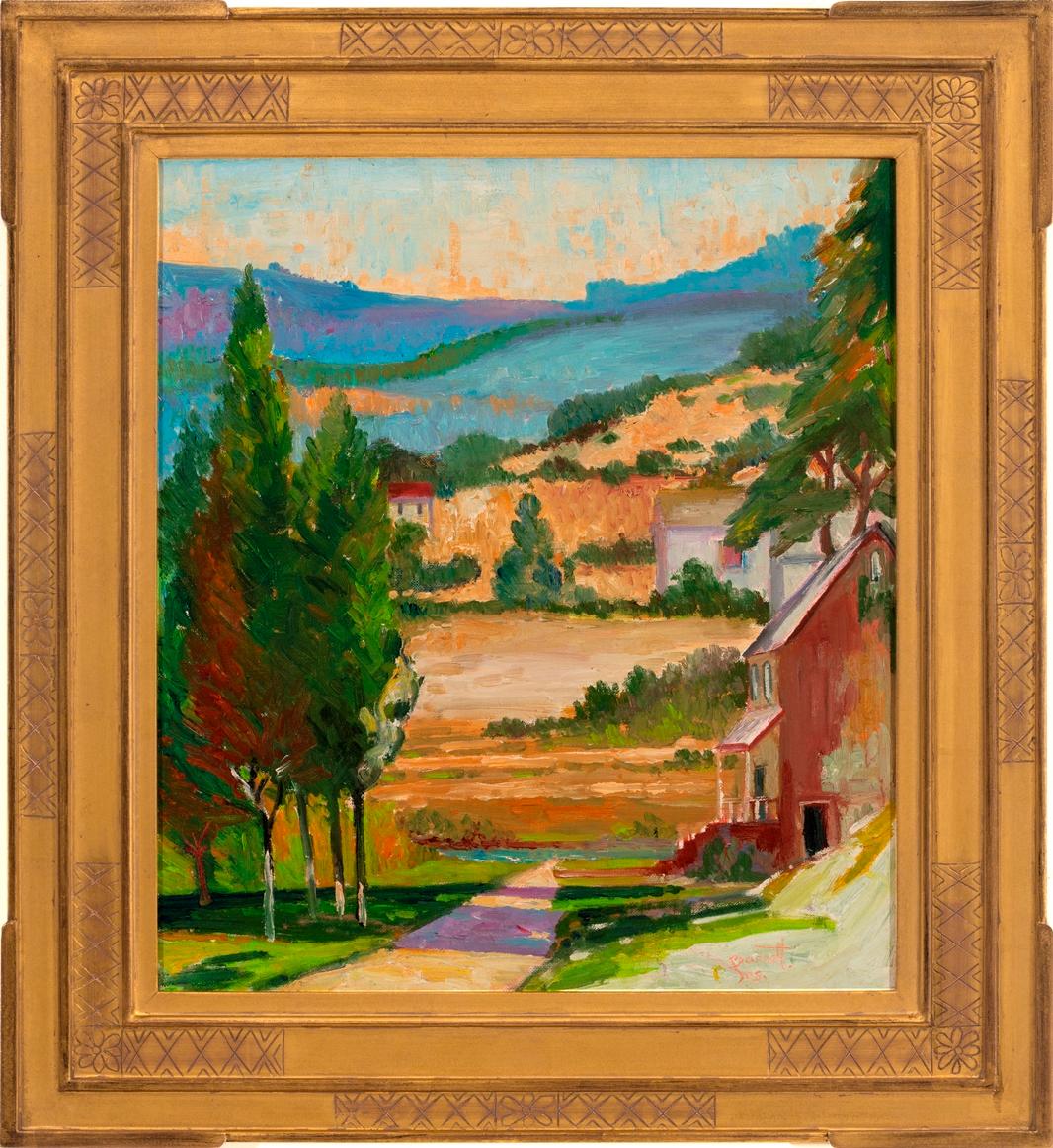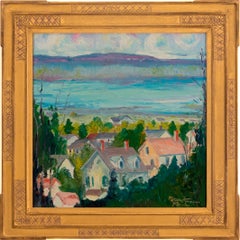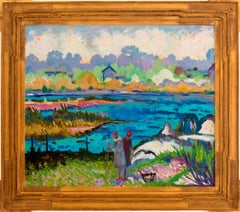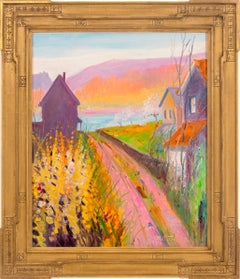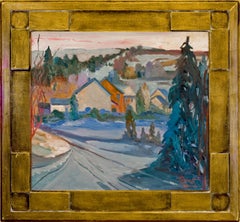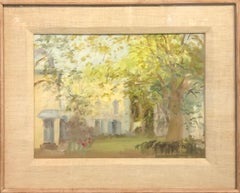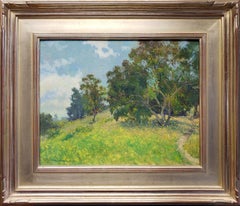Want more images or videos?
Request additional images or videos from the seller
1 of 7
Joseph Barrett"New Hope Gothic"
$11,200
£8,511.25
€9,795.79
CA$16,027.77
A$17,609.92
CHF 9,081.33
MX$210,984.73
NOK 115,304.89
SEK 108,208.95
DKK 73,160.86
About the Item
Illustrated in "Joseph Barrett, The Prime Years 1970s - 1990s", pg. 62, plate #072.
Jim’s of Lambertville is proud to offer this artwork by:
Joseph Barrett (1936 – )
Joseph Barrett was born in Midland, North Carolina, in 1936 and studied at the Massachusetts College of Art in Boston and at the Tyler School of Art in Philadelphia. Barrett, now of Lahaska, Pennsylvania, has been painting his entire adult life. His favorite subjects include the landscape surrounding New Hope and many local landmarks often encompassing figures into his compositions. Barrett utilizes a heavy impasto and his palette bears similarities to that of Fern Coppedge and George Sotter. Barrett’s paintings are always found in unique and somewhat charming handmade frames designed by the artist and finished in metal leaf.
A living contemporary of the no longer living “New Hope School” impressionist painters, Joseph Barrett resides outside of New Hope above his old-fashioned antique shop and studio. Entering Barrett’s shop is like taking a step back in time. Inside this cluttered and dusty haven of treasures from the past, is a studio spanning only four by eight feet. This little studio, containing cans of old brushes and hundreds of used paint tubes, is reminiscent of something found in a turn of the century photograph. It is here that the Pennsylvania Impressionist tradition is still being carried on.
Source: New Hope for American Art, James M. Alterman
- Creator:Joseph Barrett (1935, American)
- Dimensions:Height: 27 in (68.58 cm)Width: 29 in (73.66 cm)Depth: 2 in (5.08 cm)
- More Editions & Sizes:Frame Size 28" x 30"Price: $11,200
- Medium:
- Movement & Style:
- Period:
- Condition:
- Gallery Location:Lambertville, NJ
- Reference Number:Seller: JOL0627190721stDibs: LU3745153222
About the Seller
5.0
Vetted Professional Seller
Every seller passes strict standards for authenticity and reliability
Established in 1997
1stDibs seller since 2014
39 sales on 1stDibs
Typical response time: 1 to 2 days
- ShippingRetrieving quote...Shipping from: Lambertville, NJ
- Return Policy
Authenticity Guarantee
In the unlikely event there’s an issue with an item’s authenticity, contact us within 1 year for a full refund. DetailsMoney-Back Guarantee
If your item is not as described, is damaged in transit, or does not arrive, contact us within 7 days for a full refund. Details24-Hour Cancellation
You have a 24-hour grace period in which to reconsider your purchase, with no questions asked.Vetted Professional Sellers
Our world-class sellers must adhere to strict standards for service and quality, maintaining the integrity of our listings.Price-Match Guarantee
If you find that a seller listed the same item for a lower price elsewhere, we’ll match it.Trusted Global Delivery
Our best-in-class carrier network provides specialized shipping options worldwide, including custom delivery.More From This Seller
View All"Edge of the Village"
By Joseph Barrett
Located in Lambertville, NJ
Illustrated in "Joseph Barrett, The Prime Years 1970s - 1990s", pg. 60, plate #070.
Jim’s of Lambertville is proud to offer this artwork by:
Joseph Barrett (1936 – )
Joseph Barrett was born in Midland, North Carolina, in 1936 and studied at the Massachusetts College of Art in Boston and at the Tyler School of Art in Philadelphia. Barrett, now of Lahaska, Pennsylvania, has been painting his entire adult life. His favorite subjects include the landscape surrounding New Hope and many local landmarks often encompassing figures into his compositions. Barrett utilizes a heavy impasto and his palette bears similarities to that of Fern Coppedge and George Sotter. Barrett’s paintings are always found in unique and somewhat charming handmade frames designed by the artist and finished in metal leaf.
A living contemporary of the no longer living “New Hope School” impressionist painters, Joseph Barrett resides outside of New Hope above his old-fashioned antique shop and studio. Entering Barrett’s shop is like taking a step back in time. Inside this cluttered and dusty haven of treasures from the past, is a studio spanning only four by eight feet. This little studio, containing cans of old brushes...
Category
Late 20th Century American Impressionist Landscape Paintings
Materials
Canvas, Oil
"River Above New Hope"
By Joseph Barrett
Located in Lambertville, NJ
Illustrated in "Joseph Barrett, The Prime Years 1970s - 1990s", pg. 41, plate #047
Jim’s of Lambertville is proud to offer this artwork by:
Joseph Barrett (1936 – )
Joseph Barrett was born in Midland, North Carolina, in 1936 and studied at the Massachusetts College of Art in Boston and at the Tyler School of Art in Philadelphia. Barrett, now of Lahaska, Pennsylvania, has been painting his entire adult life. His favorite subjects include the landscape surrounding New Hope and many local landmarks often encompassing figures into his compositions. Barrett utilizes a heavy impasto and his palette bears similarities to that of Fern Coppedge and George Sotter. Barrett’s paintings are always found in unique and somewhat charming handmade frames designed by the artist and finished in metal leaf.
A living contemporary of the no longer living “New Hope School” impressionist painters, Joseph Barrett resides outside of New Hope above his old-fashioned antique shop and studio. Entering Barrett’s shop is like taking a step back in time. Inside this cluttered and dusty haven of treasures from the past, is a studio spanning only four by eight feet. This little studio, containing cans of old brushes and hundreds of used paint tubes...
Category
Late 20th Century American Impressionist Landscape Paintings
Materials
Canvas, Oil
"Road to the River"
By Joseph Barrett
Located in Lambertville, NJ
Illustrated in "Joseph Barrett, The Prime Years 1970s - 1990s", pg. 6 #006
Jim’s of Lambertville is proud to offer this artwork by:
Joseph Barrett (1936 – )
Joseph Barrett wa...
Category
Late 20th Century American Impressionist Landscape Paintings
Materials
Canvas, Oil
"Road to Pipersville"
By Joseph Barrett
Located in Lambertville, NJ
Jim’s of Lambertville is proud to offer this artwork.
Signed lower right
Joseph Barrett (b. 1936)
Joseph Barrett was born in Midland, North Carolina, in 1936 and studied at the ...
Category
20th Century American Impressionist Landscape Paintings
Materials
Canvas, Oil
"Rushland"
By Joseph Barrett
Located in Lambertville, NJ
Illustrated in "Joseph Barrett, The Prime Years 1970s - 1990s", pg. 17, Plate #020
Jim’s of Lambertville is proud to offer this artwork by:
Joseph Barrett (1936 – )
Joseph Ba...
Category
Late 20th Century American Impressionist Landscape Paintings
Materials
Canvas, Oil
$16,875
"Hills Beyond New Hope"
By Joseph Barrett
Located in Lambertville, NJ
Illustrated in "Joseph Barrett, The Prime Years 1970s - 1990s", pg. 22, Plate #025
Jim’s of Lambertville is proud to offer this artwork by:
Joseph Barrett (1936 – )
Joseph Ba...
Category
Late 20th Century American Impressionist Landscape Paintings
Materials
Canvas, Oil
You May Also Like
Landscape
Located in San Francisco, CA
This artworl "Landscape" c. 1935 is an oil painting on hardboard by renown California artist Frank Joseph Girardin, 1856-1945. It is signed at the lower right corner. The hardboard size is 20 x 30 inches, framed size is 30.5 x 40.5 inches. Framed in a wooden beige frame, with fabric liner. It is in excellent condition.
About the artist:
Born in Louisville, Kentucky in 1856, Frank joseph Girardin began his art instruction in 1870 under Frank Noble and later Frank Duveneck at the Cincinnati Art Academy. A semi-pro baseball player in Cincinnati, he was best known for his beautiful landscapes of both Indiana and California.
An extremely active participant in the development of the Art Association of Richmond and original member of the local Sketch Club, he served on the Board of Directors of Art Association for several years. He was considered ranked next to the late John E. Bundy in talent and skill by the former Art Association Director, Mrs. Ella Bond Johnston. It was during his time in Indiana, that he received the most recognition for his work. In 1903, he won first prize for his painting, "Lingering Snow" at the Cincinnati Art Club Show. This would be one of numerous prizes and awards the he would receive during his time in Indiana, including the coveted Mary T...
Category
Mid-20th Century American Impressionist Landscape Paintings
Materials
Oil
Landscape
Located in San Francisco, CA
This artwork "Landscape" in an oil painting on canvas by noted American artist Frederick Ernest Swedlun, AKA: Ernest Fredericks (1877–1959) It is sig...
Category
Mid-20th Century American Impressionist Landscape Paintings
Materials
Oil
Untitled - Impressionist Plein Air Landscape Painting
By Stuart Shils
Located in East Quogue, NY
Impressionist style plein-air landscape painting of trees and buildings by Stuart Shils. Oil on paper mounted on rag board.
Image size: 12.75 x 17.75 inches. Frame size: 20 x 25 x ...
Category
1980s American Impressionist Landscape Paintings
Materials
Paper, Oil, Board
A New Season
By Richard Humphrey
Located in Pasadena, CA
Provenance
Acquired by American Legacy Fine Arts directly from the artist
Signed "R Humphrey" on lower left
Artist Statement
"A red bougainvillea marks a small memorial near the top of the trail. A warm spring breeze moves through the newly flowered grass." — Richard Humphrey...
Category
2010s American Impressionist Landscape Paintings
Materials
Canvas, Oil
American Impressionist Bernard Corey Landscape Painting New England
By Bernard Corey
Located in Rockport, MA
This painting, "Tucked In (Home In the Woods)," by Bernard Corey, captures a serene, wooded landscape with a small, tucked-away home surrounded by trees. Corey's attention to the nat...
Category
20th Century American Impressionist Landscape Paintings
Materials
Oil
Jon Blanchette Northern California Countryside Oil Painting, Mid-Century
By Jon Blanchette
Located in Denver, CO
This charming Northern California landscape painting by American artist Jon Blanchette (1908–1987) captures the serene beauty of rural life in the mid-20th century. Painted circa 195...
Category
Mid-20th Century American Impressionist Landscape Paintings
Materials
Oil
More Ways To Browse
American Gothic
Gothic Oil Painting
American Gothic Painting
Fauvist Style Paintings
Fire Island Pines
Fishing Trawler
Forest Floor Paintings
Frank Boggs
French Impressionist Painting San Tropez
French Vineyards Paintings
G Anderson
G Harvey Artist
Giuliana Lazzerini
Grain Elevator
Greek Village
Greener Pastures Painting
Irish Cottage
Irish Wolfhound
